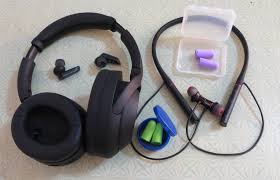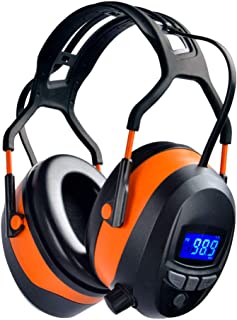Table of Contents
If you’re in the market for a noise reduction solution, it’s important to understand your options. Should you go with earmuffs or noise cancelling headphones? Depending on what exactly you’re looking to reduce the amount of sound coming through while still providing comfort and convenience, either one may be a suitable choice. In this article, we’ll help explain their differences so that you can make an informed decision.

What Is The Key Difference Between Earmuffs And Noise Cancelling Headphones?
The key difference between earmuffs and noise cancelling headphones is that earmuffs physically block out sound, while noise cancelling headphones use active noise cancellation technology to reduce ambient noise.
Earmuffs work by creating a physical barrier between the ear and the external noise source. The most common type of earmuff is made from two cups that fit over both ears, connected with a band across the top of the head. They are usually made from foam or wax-filled plastic, although acoustic foam is sometimes used for better sound insulation. They use a combination of cloth or foam padding, along with tight-fitting cups that enclose the ears and this design acts as just a soundproofing one.

Noise cancelling headphones use a different method to reduce external noise – technologies like electronic circuitry or active noise reduction technology. Electronic circuitry works by electronically detecting incoming sounds and then producing an opposing sound wave to cancel out or significantly reduce the level of noise reaching your ears. Active noise reduction technology uses microphones to detect incoming sound waves and create an opposite waveform that cancels out the original sound.This technology is effective at reducing background noise while still allowing you to listen to audio content without interruption.
Benefits of Earmuffs
Comfort
Earmuffs are comfortable to wear and provide a secure fit, ensuring that they remain in place while blocking out unwanted sound. They are often made of soft materials like foam or acoustic foam, providing maximum comfort and sound insulation. Furthermore, some models feature adjustable headbands for added convenience and comfort.
Ease Of Use
Earmuffs are easy to use and require minimal setup or maintenance. Simply put them on your head, adjust the headband for a comfortable fit, and you’re good to go. They don’t require batteries or regular cleaning like some other types of hearing protection gear.’
Cost-Effectiveness
Earmuffs tend to be more affordable than other types of hearing protection gear, making them a great option for those on a budget.
Durability
Their durability means that you can get long-term use from your earmuffs without having to replace them frequently. This makes them a great choice for those who need reliable hearing protection at an affordable price point.
Protection Against the Cold
In freezing temperatures, earmuffs provide extra warmth and comfort for your ears. They act as a barrier to the icy chill of winter weather, protecting your ears from harm.
ProCase Noise Reduction Safety Ear Muffs

- ProCase efficient hearing protection is solid and durable, ideal for shooting, construction, mowing, racing, sports events, studying,...
- Constructed by solid ABS shell and thickened foam. SNR 34dB rating, ANSI S3.19 (US) certified
- The adjustable headband with metal prop and 360 degree rotatable ear cups fit most head sizes from kids to adults. Generous space...
Drawbacks of Earmuffs
Limited Coverage
Although earmuffs provide excellent hearing protection, they may not cover all of the areas around your ears that are exposed to loud noise. As such, they may not offer as much protection as other types of hearing protection gear like ear plugs or noise cancelling headphones
Decreased Comfort In Hot Weather
Earmuffs can become quite warm and uncomfortable in hot weather, so they may not be the best choice for those who work outdoors or in hot environments.
Limited Sound Quality Improvement
Earmuffs do not improve sound quality like noise cancelling headphones, so they may not be the ideal choice for those who want to enjoy music or other audio sources with greater clarity.
Benefits Of Noise Cancelling Headphones
Sound Quality
Noise cancelling headphones use advanced technology to produce clear sound without the interference of outside noise. This allows you to enjoy music and other audio sources with greater clarity and detail, no matter where you are.

Blocking Out Low Frequency Sounds
Noise canceling headphones are better for blocking out low frequency sounds such as engine noises or air conditioning hums, but they may not be able to block out loud noises like shouting or construction work. Ultimately, it depends on what type of environment you need protection from in order to determine which would work best for you.
Ligt Weight
Noise cancelling headphones tend to be lightweight, making them great for travel or long-term wear. This makes them an ideal choice for those who need reliable sound insulation on the go, not so bulk as traditional earmuffs.
Stylishness
They are more stylish and can be used as a fashion accessory. Many noise cancelling headphones come in a variety of colors and styles, allowing you to choose based on personal preference or style.
Additional Technologies
Besides just the usual technologies, these headphones are also equipped with microphones for hands-free conversations and unique features like “transparent listening mode”, voice assistant or active noise cancelling.
Many noise cancelling headphones have customizable settings that allow you to control the amount of noise cancellation and to adjust your listening experience depending on your environment, so you can enjoy sound without sacrificing clarity or comfort.
Soundcore by Anker Life Q30 Active Noise Cancelling Headphones

- Advanced Noise Cancellation Technology: Maintain your focus with Life Q30’s hybrid active noise cancellation. Dual noise-detecting...
- Ultimate Noise Cancellation Experience: Customize Life Q30’s noise cancellation with 3 modes—Transport minimizes airplane engine...
- Hi-Res Music: Hear every detail of your favorite songs thanks to Life Q30’s 40mm drivers. The highly-flexible silk diaphragms...
Drawbacks Of Noise Canceling Headphones
Price
Noise cancelling headphones are typically quite expensive compared to traditional ear protection gear like earmuffs or ear plugs.
Complexity
Noise cancelling headphones are often powered by batteries and require some setup before use, so they may not be ideal for those who want a plug-and-play solution.
Maintenance
Noise canceling headphones need to be maintained periodically in order to ensure optimal performance, which can involve changing the batteries, cleaning the microphone and other parts, and more – all of which may require professional help. This is something that must be taken into consideration when weighing the cost of these devices against their benefits.
Video: TOP 5 – Best Noise Cancelling Headphones 2022
Overall
Earmuffs provide an effective and affordable way to protect your ears from loud noises. They are easy to use and require minimal maintenance, making them great for long-term use. However, their lack of sound quality improvement and limited coverage may make them unsuitable for certain applications.
Noise canceling headphones provide a more comprehensive solution for blocking out external noise and improving sound quality without sacrificing comfort or convenience. As such, it’s important to consider all of your options before deciding which type of hearing protection gear is right for you.
